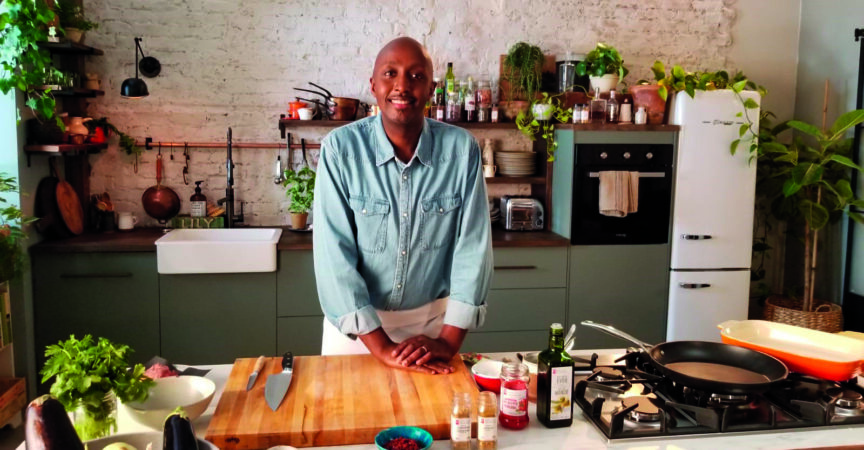A Letter To My Daughter by Chef Bashir Munye
By Chef Bashir Munye
A story about how food saved me
Dear Lula,
This letter of love affirmation is for all those nights I spent expediting service or behind the line cooking until midnight, only to come home to find you sleeping. I hope you grow to understand me and see the man I have become. This is a story about how food saved me.
Before becoming your father, I was a chef with a complex career driven by the love of cooking and a desire to nurture and help people.
When I began in this industry, kitchens were full of racism, homophobia, misogyny and other forms of oppression. Kitchen brigades thrived in this type of culture – a culture that I did not design and have been escaping for many years to create a path of equity for the next generation of cooks.
My nomadic journey began with some beautiful memories of my childhood – sitting on the laps of my grandmothers and aunties, being passed around and fed in the kitchen. I still recall the laughter, the smells and the love shared in our home that gave me a sense of belonging and identity. At that young age, I could not understand why my father, myself and other men were not allowed in the kitchen. I later recognized that this was due in part to patriarchal roles in Somali society. Women in my family – as in many other cultures – were restricted and oppressed by men in the kitchen and other spaces.
When I migrated to Italy, I was the only African child in a Christian Catholic all-boys boarding school. I was forced to obey new customs, pray to a God I didn’t know and speak a language that was foreign to me. I started to feel an emotional disconnection from my culture and the rich traditions of my upbringing. I was just five years old and wanted so badly to be able to hold on to my own identity.
When I was offered the first meal at school, I instinctively started eating with my hands. A nun shouted at me: “Solamente animali e selvaggi magiano con le mani!” (Translation: “Only animals and savages eat with their hands!”). Hearing those words as a child was so painful. The trauma of that moment made me reflect on the years where I felt most loved and cared for with food rituals that brought comfort. From that moment on, eating with my hands became something shameful. I internalized my self-hatred by rejecting everything my culture represented and embracing the indoctrination of the colonial frame of mind. For the longest time, that trauma manifested in me as a chef as I fought against my longing to be connected with my own traditions or foodways as a Somali person. I was afraid of the stigma and the taboo of cooking “African Food” – consuming it with my hands, or sitting on the floor.
My healing began when I moved to Toronto, Ontario from Virgina, with a simple plate of spaghetti with tomato sauce, xilib suuqar (finely diced beef stew) and xawas ( a fragrant combination of spices, similar to garam masala, with a pronounced hint of cumin). It took me back to that time where life was simple and I felt carefree surrounded by family, listening to those stories of a community still vibrant and resilient.
I never had dreams to become a chef or work in the hospitality industry. My ayeeyo (grandmother) wanted me to become a lawyer, a diplomat, or even a politician. Perhaps I got lost like many of us who migrate into a new place – we must start all over again, hoping to build a better future for ourselves and our family.
Cooking really saved me from becoming someone that I could not see myself becoming. After working at the YMCA, I worked in an Italian restaurant called Grazie and then landed a sous chef position at a restaurant that was focused on training marginalized youth in the hospitality industry. I was one of those youth; young and Black with a lack of Canadian culinary experience.
I want to be part of the solution to create a future generation of foodservice employees who are anti-racist, anti-misogynistic and anti-homophobic — a solution where workers can make a living wage, where women don’t have to make a choice between work and family.
My experience as a sous chef at this restaurant impacted me so deeply. Many of the participants/cooks had experienced hardships such as homelessness, substance abuse and unwanted teenage pregnancy. Cooking became more than just cooking; it gave me a purpose greater than putting food on a plate. Although in those four years I went to sleep many times emotionally drained, I would wake up every day with the desire to make impactful change in someone’s life through cooking, and it felt great.
In 2000, I went to culinary school at George Brown College and never looked back. I worked in some very beautiful hotels, renowned restaurants and catering companies, but those beautiful spaces were also very toxic, and I felt as though I was losing a bit of myself every day. This led me to create a space that reflected my own ideologies through my business – My Little Dumplings (named after you, your brother Hamza and your sister Zenzi). My Little Dumplings was the first farm-to-table, culturally diverse dumpling place focused on using 70 per cent local ingredients sold at farmers markets. Those years at the farmer’s markets really changed my understanding of the tribulations that farmers go through every day.
Despite my love for cooking, I needed to transition into something that allowed me to grow in a different direction. I became a culinary professor in the most diverse culinary school in Canada, and I love it. My experience teaching at a local college allowed me to go back to school to pursue a Master in Environmental Studies at York University. Despite life circumstances, the emergence of COVID-19 and wanting to give up on numerous occasions, having you around gave me the strength and resilience to continue and complete my studies.
After decades in this industry and the completion of my Master’s, I now understand how deeply our food system is entrenched in neoliberal capitalism. A system that is based on the exploitation of workers surviving on a minimum wage instead of living wage. A system where women are not treated as equals to men and are systematically underrepresented in positions of leadership. Where BIPOC are still experiencing direct and covert racism in every aspect of the system, from migrant workers to food packagers.
I’m proud that I have coined the term “nomadic comfort food” for my style of cooking based on my own nomadic, pastoral heritage – a way of cooking driven by local, diverse and culturally appropriate ingredients that recreates something that makes me feel at home.
I want to be part of the solution to create a future generation of foodservice employees who are anti-racist, anti-misogynistic and anti-homophobic — a solution where workers can make a living wage, where women don’t have to make a choice between work and family. Where BIPOC chefs can cook food that is culturally significant to them without the fear of being stigmatized, shamed or devalued or of their plates being seen as cheap ethnic food.
I believe we can be all be better together as active learners in dismantling forms of oppression and challenging ourselves on whether we are contributing to change or maintaining and perpetuating oppression. It can be as simple as asking yourself, Are the people who work for you experiencing hunger?” Did you know that most people in the food sector get paid $15 per hour? That’s about $2,000 a month or $24,000 per year. The Canadian government suggests allocating 10 per cent of your annual income to food, which equates to $2,400 per year, $200 per month, $100 bi-weekly, $7 per day. Lula, in some places, you’ll be lucky to have a decent breakfast for that amount.

his Daughter Lula
Lula, my journey has taught me that I’m a passionate believer, and that food is a fundamental human right (your right). I advocate for the right of people to be food sovereign through public engagement, culinary and academic panel conversation, and creating direct relationships with farmers and cooking with food that is culturally appropriate. I’m proud that I have coined the term “nomadic comfort food” for my style of cooking, based on my own nomadic, pastoral heritage – a way of cooking driven by local, diverse and culturally appropriate ingredients that recreates something that makes me feel at home. That yearning that I have been experiencing over the years to get back to my cultural roots has been satisfied. I finally feel comfortable enough in my own skin to critically reflect on my shortcomings as a chef and my growth and contribution to the food system as a culinary professor and food activist.
I like the person that I am becoming, and I hope you are as proud of me as I am of you.
With love,
Abo
Bashir Munye
Article adapted for MENU from Chef Bashir Munye’s personal letter to his daughter, Lula.
A version of this letter was previously published in MarQuee magazine.









